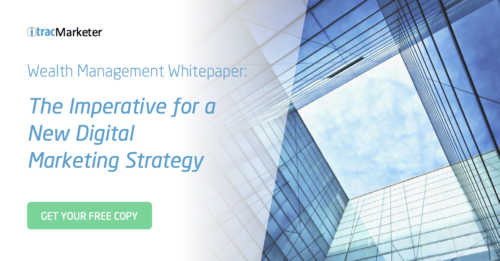The financial services marketplace in wealth management is changing radically due to demographic trends – aging Baby Boomers and Millennials, new technology – including robo-advisors as well as virtual advisors, and an array of new digital communications channels and in order to stay relevant there is a need to build the wealth manager’s digital brand.
To meet these challenges and successfully build business with today’s digitally savvy customers, financial marketers need to adopt a modern marketing strategy that provides marketing content that engages personally and emotionally with customers, and then build new processes using automation tools that will enable success for their local advisor and broker teams.
In Wealth Management what’s more important – Corporate Brand vs. Wealth Manager’s Digital Brand?
[bctt tweet=”In Wealth Management what’s more important – Corporate Brand vs. Wealth Manager’s Digital Brand?” username=”@itracMarketer”]
However, when communications and content are delivered to potential and existing customers directly from the corporate brand there is a lost opportunity for increasing a connection to their local wealth or investment professional. That is where the relationship starts, grows and is developed so marketers need to find a better way to support and build the wealth manager’s digital brand.
Wealth managers and advisors are facing more challenges in their jobs than ever before in maintaining and growing their customers with increased scrutiny on fees in addition to volatility in the marketplace. They require more than traditional corporate brand support, product information and generic educational content to build their own digital brand, reputation and trust with a new generation of potential high net worth customers.
While there is some debate over focusing too much time and effort on a younger generation before they have accumulated significant wealth the following information should provide motivation for marketers to help expedite investment managers and advisors to activate their digital presence.
3 Insights that Reveal the Importance of Millennials in Financial Services
Research conducted by PwC as well as Greenwich Associates and LinkedIn, highlight the enormous opportunities as well as the risks this generation presents for financial organizations and their wealth management professionals.
Here are three key research findings that demonstrate the impact Millennials are having on financial services:
- “By 2020, Millennials and Generation X will control $30 trillion or half of all investable assets.” (2016 Wealth Management Study, LinkedIn Greenwich Associates )
- The inheritors of wealth over the next five to 10 years will not necessarily choose to keep their parents’ financial advisors. In fact, a recent PwC survey showed asset attrition rates of more than 50 percent in intergenerational transfers of wealth. (PwC: 2016 Wealth Management Trends. A Revolution Both Loud and Quiet)
- “Nearly one-fifth of HNWIs (High Net Worth Investors) and two out of every five HNW Millennial plan to change their wealth manager in the next 12 months.” (2016 Wealth Management Study, LinkedIn Greenwich Associates )
Why Traditional Marketing does not connect with the Next Generation…
As the first generation raised as “digital natives”, empowered by the vast array of information available on the internet and social media, Millennials have developed a very different definition of an expert. It’s not so much a mistrust of authority, but rather a practice of looking for information online, as well as “social proof” through recommendations of friends. This has major implications for traditional Advisor-client relationship practices. However, it’s also important to note that Millennials are very communicative, wanting to engage with brands and their representatives personally and emotionally, but making personal connections digitally, instead of face-to-face.
How Marketers Can Help Build the Digital Brand of Wealth Managers…
To be able to connect with the new generation it’s crucial to be able to provide content that is personalized, and information focused to help build trust with advisors well before a personal phone call or office appointment. Less content that is full of industry terms and analyst jargon and more down to earth information that is genuine, useful and easily to read which help build personal connections.
Marketing automation that is conducted “on-behalf” of Sales or Advisors in this case is one way to help make this transition as smooth as possible. It allows head office to develop brand controlled communications, content and messaging while personalizing the messaging and distribution on behalf of offices, broker teams and individual sales people. It’s an excellent opportunity to help start engaging Millennials and Gen X in the financial service industry. It also provides advisors and wealth managers more time to focus on their investment and asset management expertise with their clients. A win-win for organizations that will pay huge dividends in securing new business during the transition of wealth that is set to occur over the next five to ten years.
Want to learn more about the benefits of Distributed Marketing for Wealth Management and How to implement a New Digital Marketing New Strategic Framework for activating and building the digital brand of wealth managers as well as advisors?
Download our Free Whitepaper

Leave A Comment